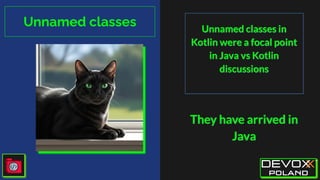Decoding Kotlin - Your Guide to Solving the Mysterious in Kotlin - Devoxx PL 2025
- 1. Kotlin Mysteries found from years working with Kotlin João Esperancinha 2024/04/24 https://jnation.pt/sessions/
- 2. Topics for today Null safety 1. Working with the Spring Framework 2. Reflection to force nulls Inline and cross-inline 1. The Java overview Tail recursive => Tail Call Optimization (TCO) 1. What is it 2. Why? 3. How it makes us work recursively and not use mutable Data classes 1. Why things work and why things don't work 2. How to fix the ones that don't 3. How to work with use-site targets. What does a `delegate` do? and other use-site targets. 1. What is a delegate 2. How can a use-site target affect it Kotlin & Java evolution 1. A main tale
- 3. About me João Esperancinha ● Java ● Kotlin ● Groovy ● Scala ● Software Engineer 10+ years ● JESPROTECH owner for 2 years Kong Champion/Java Professional/Spring Professional
- 4. What do I mean with Decompiling Kotlin to ByteCode to Java When we convert the bytecode to Java, we get a snapshot of how things would work in the JVM. For a real picture we would need to read the bytecode directly, which can be very difficult Let’s DEMO this!
- 5. Null-safety Kotlin promises a guarantee of null-safety. Although we can use nullable members in our classes, we really shouldn’t whenever possible. When is whenever possible?
- 6. @Table(name = "CAR_PARTS") @Entity data class CarPart( @Id val id: Long, val name: String, val productionDate: Instant, val expiryDate: Instant, val barCode: Long, val cost: BigDecimal ) CREATE SEQUENCE car_parts_id_sequence START WITH 1 INCREMENT BY 1 NO MINVALUE NO MAXVALUE CACHE 1; CREATE TABLE CAR_PARTS ( id BIGINT NOT NULL DEFAULT nextval('car_parts_id_sequence'::regclass), name VARCHAR(100), production_date timestamp, expiry_date timestamp, bar_code BIGINT, cost float ); CRUD Entity Example
- 7. CRUD Entity Example INSERT INTO CAR_PARTS (name, production_date, expiry_date, bar_code, cost) VALUES ('screw', current_date, current_date, 12345, 1.2); INSERT INTO CAR_PARTS (name, production_date, expiry_date, bar_code, cost) VALUES (null, current_date, current_date, 12345, 1.2); @Test fun `should mysteriously get a list with a car part with a name null`() { carPartDao.findAll() .filter { it.name == null } .shouldHaveSize(1) } Is this possible? Yes! ● Migrate data and database model ● Use nullables …
- 8. Reflection Example val carPartDto = CarPartDto( id = 123L, name = "name", productionDate = Instant.now(), expiryDate = Instant.now(), cost = BigDecimal.TEN, barCode = 1234L ) println(carPartDto) val field: Field = CarPartDto::class.java .getDeclaredField("name") field.isAccessible = true field.set(carPartDto, null) println(carPartDto) assert(carPartDto.name == null) println(carPartDto.name == null) data class CarPartDto( val id: Long, val name: String, val productionDate: Instant, val expiryDate: Instant, val barCode: Long, val cost: BigDecimal ) Is this possible? Yes!
- 9. Inline and crossinline. Inline and crossinline can be used in combination with each other. Inline provides bytecode copies of the code per each call point and they can even help avoid type erasure. Crossinline improves readability and some safety, but nothing really functional. Why does this matter?
- 10. Inlining code with inline fun main() { callEngineCrossInline { println("Place key in ignition") println("Turn key or press push button ignition") println("Clutch to the floor") println("Set the first gear") }.run { println(this) } } inline fun callEngineCrossInline(startManually: () -> Unit) { run loop@{ println("This is the start of the loop.") introduction { println("Get computer in the backseat") return@introduction } println("This is the end of the loop.") } println("Engine started!") } fun introduction(intro: () -> Unit) { println(LocalDateTime.now()) intro() return } public final class IsolatedCarPartsExampleKt { public static final void main() { int $i$f$callEngineCrossInline = false; int var1 = false; String var2 = "This is the start of the loop."; System.out.println(var2); introduction((Function0)IsolatedCarPartsExampleKt$cal lEngineCrossInline$1$1.INSTANCE); var2 = "This is the end of the loop."; System.out.println(var2); String var4 = "Engine started!"; System.out.println(var4); Unit var3 = Unit.INSTANCE; int var5 = false; System.out.println(var3); } public static final void introduction(@NotNull Function0 intro) { Intrinsics.checkNotNullParameter(intro, "intro"); LocalDateTime var1 = LocalDateTime.now(); System.out.println(var1); intro.invoke(); } public final void invoke() { String var1 = "Get computer in the backseat"; System.out.println(var1); } Decompiled code
- 11. Crossinline as just a marker for inlined code fun main() { callEngineCrossInline { println("Place key in ignition") println("Turn key or press push button ignition") println("Clutch to the floor") println("Set the first gear") }.run { println(this) } } inline fun callEngineCrossInline(crossinline startManually: () -> Unit) { run loop@{ println("This is the start of the loop.") introduction { println("Get computer in the backseat") startManually() return@introduction } println("This is the end of the loop.") } println("Engine started!") } fun introduction(intro: () -> Unit) { println(LocalDateTime.now()) intro() return } public final class IsolatedCarPartsExampleKt { public static final void main() { int $i$f$callEngineCrossInline = false; int var1 = false; String var2 = "This is the start of the loop."; System.out.println(var2); introduction((Function0)(new IsolatedCarPartsExampleKt$main$$inlined$callEngineCro ssInline$1())); var2 = "This is the end of the loop."; System.out.println(var2); String var4 = "Engine started!"; System.out.println(var4); Unit var3 = Unit.INSTANCE; int var5 = false; System.out.println(var3); } public static final void introduction(@NotNull Function0 intro) { Intrinsics.checkNotNullParameter(intro, "intro"); LocalDateTime var1 = LocalDateTime.now(); System.out.println(var1); intro.invoke(); } public final void invoke() { String var1 = "Get computer in the backseat"; System.out.println(var1); int var2 = false; String var3 = "Place key in ignition"; System.out.println(var3); var3 = "Turn key or press push button ignition"; System.out.println(var3); var3 = "Clutch to the floor"; System.out.println(var3); var3 = "Set the first gear"; System.out.println(var3); } Decompiled code
- 12. Crossinline for safety object SpecialShopNonLocalReturn { inline fun goToStore(chooseItems: () -> Unit) { println("Walks in") chooseItems() } @JvmStatic fun main(args: Array<String> = emptyArray()) { goToStore { println("Make purchase") return@main } println("Never walks out") } } object SpecialShopLocalReturn { inline fun goToStore(crossinline block: () -> Unit) { println("Walks in") block() } @JvmStatic fun main(args: Array<String> = emptyArray()) { goToStore { println("Make purchase") return@goToStore } println("Walks out") } } @JvmStatic public static final void main(@NotNull String[] args) { Intrinsics.checkNotNullParameter(args, "args"); SpecialShopNonLocalReturn this_$iv = INSTANCE; int $i$f$goToStore = false; String var3 = "Walks in"; System.out.println(var3); int var4 = false; String var5 = "Make purchase"; System.out.println(var5); } @JvmStatic public static final void main(@NotNull String[] args) { Intrinsics.checkNotNullParameter(args, "args"); SpecialShopLocalReturn this_$iv = INSTANCE; int $i$f$goToStore = false; String var3 = "Walks in"; System.out.println(var3); int var4 = false; String var5 = "Make purchase"; System.out.println(var5); String var6 = "Walks out"; System.out.println(var6); } ? Decompiled code
- 13. Tail Call Optimization Since the late 50’s TCO was already a theory intentend to be applied to Tail Recursivity. It allows tail recursive functions to be transformed into iterative functions in the compiled code for better performance. What is the catch?
- 14. Tail Call Optimization sealed interface Part { val totalWeight: Double } sealed interface ComplexPart : Part{ val parts: List<Part> } data class CarPart(val name: String, val weight: Double) : Part { override val totalWeight: Double get() = weight } data class ComplexCarPart( val name: String, val weight: Double, override val parts: List<Part> ) : ComplexPart { override val totalWeight: Double get() = weight } data class Car( val name: String, override val parts: List<Part> ) : ComplexPart { override val totalWeight: Double get() = parts.sumOf { it.totalWeight } } tailrec fun totalWeight(parts: List<Part>, acc: Double = 0.0): Double { if (parts.isEmpty()) { return acc } val part = parts.first() val remainingParts = parts.drop(1) val currentWeight = acc + part.totalWeight return when (part) { is ComplexPart -> totalWeight(remainingParts + part.parts, currentWeight) else -> totalWeight(remainingParts, currentWeight) } } Why use this? All variables are immutable Tail recursive
- 15. Tail Call Optimization tailrec fun totalWeight(parts: List<Part>, acc: Double = 0.0): Double { if (parts.isEmpty()) { return acc } val part = parts.first() val remainingParts = parts.drop(1) val currentWeight = acc + part.totalWeight return when (part) { is ComplexPart -> totalWeight(remainingParts + part.parts, currentWeight) else -> totalWeight(remainingParts, currentWeight) } } public static final double totalWeight(@NotNull List parts, double acc) { while(true) { Intrinsics.checkNotNullParameter(parts, "parts"); if (parts.isEmpty()) { return acc; } Part part = (Part)CollectionsKt.first(parts); List remainingParts = CollectionsKt.drop((Iterable)parts, 1); double currentWeight = acc + part.getTotalWeight(); if (part instanceof ComplexPart) { List var10000 = CollectionsKt.plus((Collection)remainingParts, (Iterable)((ComplexPart)part).getParts()); acc = currentWeight; parts = var10000; } else { acc = currentWeight; parts = remainingParts; } } } Variables are mutable and algorithm is iterative
- 16. Tail Call Optimization Why use Tail Call Optimization(TCO) and why use tailrec? 1. tailrec allow us to use tail recursive code and transform it in the background to iterative code 2. tail recursive functions and enabling TCO on them prevents endless recursive calls due to failed check of the terminating condition 3. By using tail recursive functions and applying tailrec we enable the possible use of TCO and with it guarantee the use of a single stackframe preventing StackOverflow exceptions
- 17. Data classes and Frameworks Kotlin provides use-site targets that allow us to specify where particular annotations have to be applied. Sometimes we need them and sometimes we don’t Why?
- 18. Working with Data classes @Table(name = "CAR_PARTS") @Entity data class CarPart( @Id val id: Long, @Column @field:NotNull @field:Size(min=3, max=20) val name: String, val productionDate: Instant, val expiryDate: Instant, val barCode: Long, @field:Min(value = 5) val cost: BigDecimal ) @Table(name = "CAR_PARTS") @Entity data class CarPart( @Id val id: Long, @Column @NotNull @Size(min=3, max=20) val name: String, val productionDate: Instant, val expiryDate: Instant, val barCode: Long, @Min(value = 5) val cost: BigDecimal ) Doesn’t work Works! Why use-site targets?
- 19. Working with Data classes https://kotlinlang.org/docs/annotations.html#annotation-use-site-targets If you don't specify a use-site target, the target is chosen according to the @Target annotation of the annotation being used. If there are multiple applicable targets, the first applicable target from the following list is used: ● param ● property ● field ● https://github.com/Kotlin/KEEP/issues/402 Kotlin 2.2.0 as experimental
- 20. Working with Data classes @Target({ElementType.METHOD, ElementType.FIELD, ElementType.ANNOTATION_TYPE, ElementType.CONSTRUCTOR, ElementType.PARAMETER, ElementType.TYPE_USE}) @Retention(RetentionPolicy.RUNTIME) @Repeatable(List.class) @Documented @Constraint( validatedBy = {} ) public @interface Size { PARAMETER is selected
- 21. Working with Data classes public final class CarPart { @Id private final long id; @Column @NotNull private final String name; @NotNull private final Instant productionDate; @NotNull private final Instant expiryDate; private final long barCode; @NotNull private final BigDecimal cost; public final long getId() { return this.id; } @NotNull public final String getName() { return this.name; } @NotNull public final Instant getProductionDate() { return this.productionDate; } @NotNull public final Instant getExpiryDate() { return this.expiryDate; } public final long getBarCode() { return this.barCode; } @NotNull public final BigDecimal getCost() { return this.cost; } public CarPart(long id, @jakarta.validation.constraints.NotNull @Size(min = 3,max = 20) @NotNull String name, @NotNull Instant productionDate, @NotNull Instant expiryDate, long barCode, @Min(5L) @NotNull BigDecimal cost) { Intrinsics.checkNotNullParameter(name, "name"); Intrinsics.checkNotNullParameter(productionDate, "productionDate"); Intrinsics.checkNotNullParameter(expiryDate, "expiryDate"); Intrinsics.checkNotNullParameter(cost, "cost"); Not where we want them to be, but where they are expected
- 22. @Table(name = "CAR_PARTS") @Entity data class CarPart( @Id val id: Long, @Column @field:NotNull @field:Size(min=3, max=20) val name: String, val productionDate: Instant, val expiryDate: Instant, val barCode: Long, @field:Min(value = 5) val cost: BigDecimal ) Working with Data classes public final class CarPart { @Id private final long id; @Column @NotNull @Size( min = 3, max = 20 ) @org.jetbrains.annotations.NotNull private final String name; @org.jetbrains.annotations.NotNull private final Instant productionDate; @org.jetbrains.annotations.NotNull private final Instant expiryDate; private final long barCode; @Min(5L) @org.jetbrains.annotations.NotNull private final BigDecimal cost; Since @field forces the target, these annotations get applied where they should
- 23. Delegates and other use-site targets Delegation is a great part of the Kotlin language and it is quite different than what we are used to seeing in Java But how can we use it?
- 24. Working with Delegates interface Horn { fun beep() } class CarHorn : Horn { override fun beep() { println("beep!") } } class WagonHorn : Horn { override fun beep() { println("bwooooooo!") } } annotation class DelegateToWagonHorn annotation class DelegateToCarHorn class HornPack { @delegate:DelegateToWagonHorn val wagonHorn: Horn by SoundDelegate(WagonHorn()) @delegate:DelegateToCarHorn val carHorn: Horn by SoundDelegate(CarHorn()) } class SoundDelegate(private val initialHorn: Horn) { operator fun getValue(thisRef: Any?, property: KProperty<*>): Horn { return initialHorn } } Where is this being applied to? Horn or SoundDelegate?
- 25. Working with Delegates public final class HornPack { // $FF: synthetic field static final KProperty[] $$delegatedProperties = new KProperty[]{Reflection.property1(new PropertyReference1Impl(HornPack.class, "wagonHorn", "getWagonHorn()Lorg/jesperancinha/talks/carparts/Horn;", 0)), Reflection.property1(new PropertyReference1Impl(HornPack.class, "carHorn", "getCarHorn()Lorg/jesperancinha/talks/carparts/Horn;", 0))}; @DelegateToWagonHorn @NotNull private final SoundDelegate wagonHorn$delegate = new SoundDelegate((Horn)(new WagonHorn())); @DelegateToCarHorn @NotNull private final SoundDelegate carHorn$delegate = new SoundDelegate((Horn)(new CarHorn())); @NotNull public final Horn getWagonHorn() { return this.wagonHorn$delegate.getValue(this, $$delegatedProperties[0]); } @NotNull public final Horn getCarHorn() { return this.carHorn$delegate.getValue(this, $$delegatedProperties[1]); } } SoundDelegate Not Horn!
- 26. Working with Delegates class SanitizedName(var name: String?) { operator fun getValue(thisRef: Any?, property: KProperty<*>): String? = name operator fun setValue(thisRef: Any?, property: KProperty<*>, v: String?) { name = v?.trim() } } class PartNameDto { @get:NotBlank @get:Size(max = 12) var name: String? by SanitizedName(null) override fun toString(): String { return name ?: "N/A" } } class ImpossiblePartNameDto { @delegate:NotBlank @delegate:Size(max = 12) var name: String? by SanitizedName(null) override fun toString(): String { return name ?: "N/A" } } public final class PartNameDto { static final KProperty[] $$delegatedProperties = new KProperty[]{Reflection.mutableProperty1(new MutablePropertyReference1Impl(PartNameDto.class, "name", "getName()Ljava/lang/String;", 0))}; @Nullable private final SanitizedName name$delegate = new SanitizedName((String)null); @NotBlank @Size( max = 12 ) @Nullable public final String getName() { return this.name$delegate.getValue(this, $$delegatedProperties[0]); } … public final class ImpossiblePartNameDto { static final KProperty[] $$delegatedProperties = new KProperty[]{Reflection.mutableProperty1(new MutablePropertyReference1Impl(ImpossiblePartNameDto.class, "name", "getName()Ljava/lang/String;", 0))}; @NotBlank @Size( max = 12 ) @Nullable private final SanitizedName name$delegate = new SanitizedName((String)null); @Nullable public final String getName() { return this.name$delegate.getValue(this, $$delegatedProperties[0]); } jakarta.validation.UnexpectedTypeException: HV000030: No validator could be found for constraint 'jakarta.validation.constraints.Size' validating type 'SanitizedName'. Check configuration for 'name$delegate'...
- 27. Working with Delegates @Service data class DelegationService( val id: UUID = UUID.randomUUID() ) { @delegate:LocalDateTimeValidatorConstraint @get: Past val currentDate: LocalDateTime by LocalDateTimeDelegate() } public class DelegationService { // $FF: synthetic field static final KProperty[] $$delegatedProperties = new KProperty[]{Reflection.property1(new PropertyReference1Impl(DelegationService.class, "currentDate", "getCurrentDate()Ljava/time/LocalDateTime;", 0))}; @LocalDateTimeValidatorConstraint @NotNull private final LocalDateTimeDelegate currentDate$delegate; @NotNull private final UUID id; @Past @NotNull public LocalDateTime getCurrentDate() { return this.currentDate$delegate.getValue(this, $$delegatedProperties[0]); } @Target(AnnotationTarget.FIELD, AnnotationTarget.FUNCTION) @Retention(AnnotationRetention.RUNTIME) @Constraint(validatedBy = [LocalDateTimeValidator::class]) @MustBeDocumented annotation class LocalDateTimeValidatorConstraint( val message: String = "Invalid value", val groups: Array<KClass<*>> = [], val payload: Array<KClass<*>> = [] ) class LocalDateTimeValidator : ConstraintValidator<LocalDateTimeValidatorConstraint, LocalDateTimeDelegate> { override fun initialize(constraintAnnotation: LocalDateTimeValidatorConstraint) { } override fun isValid(value: LocalDateTimeDelegate, context: ConstraintValidatorContext): Boolean { val country = Locale.getDefault().country.trim() logger.info("Current country is {}", country) return when (country) { "", "NL", "US", "PT", "ES", "UK", "FR"-> true else -> false } } companion object { val logger: Logger = getLogger<LocalDateTimeValidator>() } }
- 28. Unnamed classes Unnamed classes in Kotlin were a focal point in Java vs Kotlin discussions They have arrived in Java
- 29. Main.java void main() { System.out.println("Hello, world!"); } Unnamed Classes Main.kt fun main(args: Array<String>) { runApplication<CarPartsDataStructureApplication>(*args) } JEP 445: Unnamed Classes and Instance Main Methods Friendly competition drives innovation, but also a lot of synergy
- 30. What’s next? ● Better understanding of the Kotlin Language. ● Better understanding of the Spring Framework, Quarkus, Ktor and where, when and how to use them. ● Search the Kotlin documentation before searching for the seemingly unexplainable. ● Nothing is perfect and Kotlin also falls into that category and recognizing that, allow us to be better. ● Check if Kotlin or Java are the right languages for you and your team
- 31. Questions and answers Q: Is the use of tailrec only intended to make sure we use readable code as for example with recursive functions and then use it iteratively when compiled to the bytecode? A: A quick answer is yes. The nuanced answer is that, while tailrec enables the compiler to apply the optimization only if the function is tail recursive, it is only with the application of TCO, that we can make sure to avoid StackOverflow exceptions, because with TCO we use only one StackFrame. It is TCO that does this and not exactly the application of tailrec.
- 32. Questions? I am an inquisitive cat
- 33. Resources ● Null Safety: https://kotlinlang.org/docs/null-safety.html ● Inline: https://kotlinlang.org/docs/inline-functions.html ● Tail Call Optimization: https://kotlinlang.org/docs/functions.html#tail-recursive-functions ● Annotation use-site targets: https://kotlinlang.org/docs/annotations.html#annotation-use-site-targets ● Spring Validation via AOP : https://docs.spring.io/spring-framework/reference/web/webmvc/mvc-controller/ann-validation.html ● https://github.com/Kotlin/KEEP/issues/402 ● https://openjdk.org/jeps/445
- 34. Source code and slides ● https://github.com/jesperancinha/kotlin-mysteries
- 35. About me ● Homepage - https://joaofilipesabinoesperancinha.nl ● LinkedIn - https://www.linkedin.com/in/joaoesperancinha/ ● YouTube - JESPROTECH - https://www.youtube.com/@jesprotech ● Bluesky - https://bsky.app/profile/jesperancinha.bsky.social ● Mastodon - https://masto.ai/@jesperancinha ● GitHub - https://github.com/jesperancinha ● Hackernoon - https://hackernoon.com/u/jesperancinha ● DevTO - https://dev.to/jofisaes ● Medium - https://medium.com/@jofisaes
- 36. Thank you!







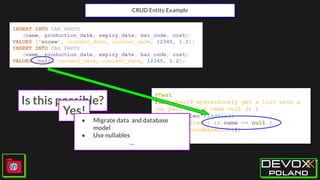



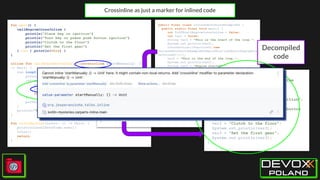
![Crossinline for safety
object SpecialShopNonLocalReturn {
inline fun goToStore(chooseItems: () -> Unit) {
println("Walks in")
chooseItems()
}
@JvmStatic
fun main(args: Array<String> = emptyArray()) {
goToStore {
println("Make purchase")
return@main
}
println("Never walks out")
}
}
object SpecialShopLocalReturn {
inline fun goToStore(crossinline block: () -> Unit) {
println("Walks in")
block()
}
@JvmStatic
fun main(args: Array<String> = emptyArray()) {
goToStore {
println("Make purchase")
return@goToStore
}
println("Walks out")
}
}
@JvmStatic
public static final void main(@NotNull String[] args) {
Intrinsics.checkNotNullParameter(args, "args");
SpecialShopNonLocalReturn this_$iv = INSTANCE;
int $i$f$goToStore = false;
String var3 = "Walks in";
System.out.println(var3);
int var4 = false;
String var5 = "Make purchase";
System.out.println(var5);
}
@JvmStatic
public static final void main(@NotNull String[] args) {
Intrinsics.checkNotNullParameter(args, "args");
SpecialShopLocalReturn this_$iv = INSTANCE;
int $i$f$goToStore = false;
String var3 = "Walks in";
System.out.println(var3);
int var4 = false;
String var5 = "Make purchase";
System.out.println(var5);
String var6 = "Walks out";
System.out.println(var6);
}
?
Decompiled
code](https://image.slidesharecdn.com/decodingkotlin-yourguidetosolvingthemysteriousinkotlin-devoxxpl20205-250613102534-3fb70a96/85/Decoding-Kotlin-Your-Guide-to-Solving-the-Mysterious-in-Kotlin-Devoxx-PL-2025-12-320.jpg)


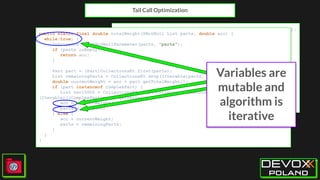



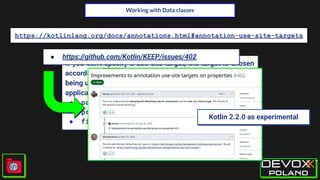


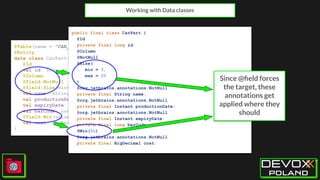


![Working with Delegates
public final class HornPack {
// $FF: synthetic field
static final KProperty[] $$delegatedProperties = new KProperty[]{Reflection.property1(new
PropertyReference1Impl(HornPack.class, "wagonHorn", "getWagonHorn()Lorg/jesperancinha/talks/carparts/Horn;",
0)), Reflection.property1(new PropertyReference1Impl(HornPack.class, "carHorn",
"getCarHorn()Lorg/jesperancinha/talks/carparts/Horn;", 0))};
@DelegateToWagonHorn
@NotNull
private final SoundDelegate wagonHorn$delegate = new SoundDelegate((Horn)(new WagonHorn()));
@DelegateToCarHorn
@NotNull
private final SoundDelegate carHorn$delegate = new SoundDelegate((Horn)(new CarHorn()));
@NotNull
public final Horn getWagonHorn() {
return this.wagonHorn$delegate.getValue(this, $$delegatedProperties[0]);
}
@NotNull
public final Horn getCarHorn() {
return this.carHorn$delegate.getValue(this, $$delegatedProperties[1]);
}
}
SoundDelegate
Not Horn!](https://image.slidesharecdn.com/decodingkotlin-yourguidetosolvingthemysteriousinkotlin-devoxxpl20205-250613102534-3fb70a96/85/Decoding-Kotlin-Your-Guide-to-Solving-the-Mysterious-in-Kotlin-Devoxx-PL-2025-25-320.jpg)
![Working with Delegates
class SanitizedName(var name: String?) {
operator fun getValue(thisRef: Any?,
property: KProperty<*>): String? = name
operator fun setValue(thisRef: Any?,
property: KProperty<*>, v: String?) {
name = v?.trim()
}
}
class PartNameDto {
@get:NotBlank
@get:Size(max = 12)
var name: String? by SanitizedName(null)
override fun toString(): String {
return name ?: "N/A"
}
}
class ImpossiblePartNameDto {
@delegate:NotBlank
@delegate:Size(max = 12)
var name: String? by SanitizedName(null)
override fun toString(): String {
return name ?: "N/A"
}
}
public final class PartNameDto {
static final KProperty[] $$delegatedProperties = new KProperty[]{Reflection.mutableProperty1(new
MutablePropertyReference1Impl(PartNameDto.class, "name", "getName()Ljava/lang/String;", 0))};
@Nullable
private final SanitizedName name$delegate = new SanitizedName((String)null);
@NotBlank
@Size(
max = 12
)
@Nullable
public final String getName() {
return this.name$delegate.getValue(this, $$delegatedProperties[0]);
}
…
public final class ImpossiblePartNameDto {
static final KProperty[] $$delegatedProperties = new KProperty[]{Reflection.mutableProperty1(new
MutablePropertyReference1Impl(ImpossiblePartNameDto.class, "name", "getName()Ljava/lang/String;",
0))};
@NotBlank
@Size(
max = 12
)
@Nullable
private final SanitizedName name$delegate = new SanitizedName((String)null);
@Nullable
public final String getName() {
return this.name$delegate.getValue(this, $$delegatedProperties[0]);
}
jakarta.validation.UnexpectedTypeException:
HV000030: No validator could be found for
constraint 'jakarta.validation.constraints.Size'
validating type 'SanitizedName'. Check
configuration for 'name$delegate'...](https://image.slidesharecdn.com/decodingkotlin-yourguidetosolvingthemysteriousinkotlin-devoxxpl20205-250613102534-3fb70a96/85/Decoding-Kotlin-Your-Guide-to-Solving-the-Mysterious-in-Kotlin-Devoxx-PL-2025-26-320.jpg)
![Working with Delegates
@Service
data class DelegationService(
val id: UUID = UUID.randomUUID()
) {
@delegate:LocalDateTimeValidatorConstraint
@get: Past
val currentDate: LocalDateTime by LocalDateTimeDelegate()
}
public class DelegationService {
// $FF: synthetic field
static final KProperty[] $$delegatedProperties = new KProperty[]{Reflection.property1(new
PropertyReference1Impl(DelegationService.class, "currentDate",
"getCurrentDate()Ljava/time/LocalDateTime;", 0))};
@LocalDateTimeValidatorConstraint
@NotNull
private final LocalDateTimeDelegate currentDate$delegate;
@NotNull
private final UUID id;
@Past
@NotNull
public LocalDateTime getCurrentDate() {
return this.currentDate$delegate.getValue(this, $$delegatedProperties[0]);
}
@Target(AnnotationTarget.FIELD, AnnotationTarget.FUNCTION)
@Retention(AnnotationRetention.RUNTIME)
@Constraint(validatedBy = [LocalDateTimeValidator::class])
@MustBeDocumented
annotation class LocalDateTimeValidatorConstraint(
val message: String = "Invalid value",
val groups: Array<KClass<*>> = [],
val payload: Array<KClass<*>> = []
)
class LocalDateTimeValidator : ConstraintValidator<LocalDateTimeValidatorConstraint, LocalDateTimeDelegate> {
override fun initialize(constraintAnnotation: LocalDateTimeValidatorConstraint) {
}
override fun isValid(value: LocalDateTimeDelegate, context: ConstraintValidatorContext): Boolean {
val country = Locale.getDefault().country.trim()
logger.info("Current country is {}", country)
return when (country) {
"", "NL", "US", "PT", "ES", "UK", "FR"-> true
else -> false
}
}
companion object {
val logger: Logger = getLogger<LocalDateTimeValidator>()
}
}](https://image.slidesharecdn.com/decodingkotlin-yourguidetosolvingthemysteriousinkotlin-devoxxpl20205-250613102534-3fb70a96/85/Decoding-Kotlin-Your-Guide-to-Solving-the-Mysterious-in-Kotlin-Devoxx-PL-2025-27-320.jpg)
